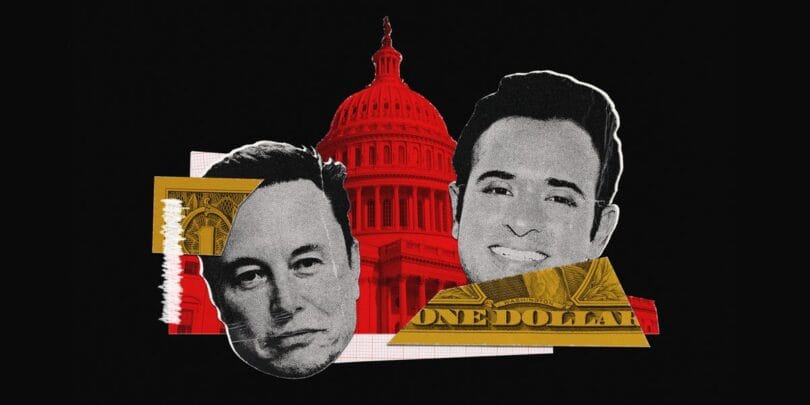- Elon Musk and Vivek Ramaswamy aim to cut $2 trillion from the federal budget by June 4, 2026.
- They’ve said they will fire federal employees, « delete » agencies, and publicize all of their work.
- The DOGE leaders have name-dropped many causes they might target, like DEI efforts and public media.
Elon Musk and Vivek Ramaswamy have big plans for the Department of Government Efficiency.
The two have promised to significantly reduce the federal budget, with a goal of cutting $2 trillion in spending. In 2024, federal spending reached $6.75 trillion, with nine-tenths going to federal programs. President-elect Donald Trump has long sworn not to touch Social Security or Medicare benefits, which comprise a significant chunk of the budget.
Here’s a running list of things Musk and Ramaswamy have said they will do as they gear up to take on this new role.
Representatives for Musk and Trump did not respond to Business Insider’s request for comment. A representative for Ramaswamy declined to comment.
Slash regulations
Musk and Ramaswamy plan to suggest regulations to cut to Trump, whom they said could then use executive actions to pause the regulations and begin the removal process.
The co-heads outlined their ideas in an opinion piece in The Wall Street Journal and explained that they plan to lean on two recent SCOTUS rulings, West Virginia v. Environmental Protection Agency and Loper Bright Enterprises v. Raimondo. The cases, they said, « suggest that a plethora of current federal regulations exceed the authority Congress has granted under the law. »
Some legal experts previously told BI that the DOGE leaders are misinterpreting the lawsuits, which they said do not add to the executive branch’s ability to curb regulations. Under the rulings, agencies still need to comply with a lengthy administrative process to change or overturn rules, the experts said.
‘Delete’ entire agencies, or at least vastly change them
A key part of DOGE’s cost-cutting agenda has to do with scaling back government agencies — Ramaswamy promised that the group will « delete » entire departments. Political scientists and fellows at Washington think tanks previously told BI that deleting departments outright almost always requires congressional approval, making DOGE’s goal seem unrealistic to some. There are more than 440 government agencies; Musk has said he wants to trim that down to no more than 99.
Here are some of the agencies DOGE plans to target:
Planned Parenthood and public media may be impacted
Musk and Ramaswamy criticized the Corporation for Public Broadcasting and « progressive groups like Planned Parenthood » in their op-ed. They said that DOGE will try to curb federal spending « by taking aim » at the funds appropriated for those services, among others.
The CPB is the largest funding source for public radio, television, and online services, primarily for local public media — in fiscal year 2024, it had a budget of $535 million. Congress created the CPB and authorizes the budget. Between 2019 and 2021, American affiliates of Planned Parenthood received approximately $148 million in federal grants, according to the Government Accounting Office.
Target expired federal spending commitments
Chip Somodevilla/Getty Images
Musk and Ramaswamy said in their op-ed that they plan to go after expired federal expenditures. According to the Congressional Budget Office, $516 billion worth of federal appropriations in 2024 have expired, with the largest programs in terms of spending relating to veterans’ healthcare, drug development, and NASA. Neither Musk nor Ramaswamy have specified which expired authorizations they’ll target.
Reduce the federal workforce
Musk and Ramaswamy said they want to significantly reduce the size of the federal workforce, though haven’t specified precisely how many employees should be cut. There were more than 2 million federal employees as of 2023, according to the nonpartisan group the Partnership for Public Service.
Civil service workers benefit from job protections that make it difficult to fire them, but the DOGE co-leaders said in their Journal article that Trump could implement « reductions in force » that aren’t directed at individual employees.
In the op-ed, Musk and Ramaswamy said that after eliminating federal regulations, « mass head-count reductions across the federal bureaucracy » will follow. They plan to determine the minimum number of employees needed at each department and said they might enact policies that lead some staffers to voluntarily resign, like return-to-office mandates, early retirement offers, and severance packages.
Federal employee salaries don’t comprise a big chunk of the budget — not including military personnel, their annual salaries and benefits total approximately $305 billion, or 4% of spending, per the Washington Post. If Musk and Ramaswamy got rid of 25% of the federal workforce, government spending would fall by around 1%.
Relocate some federal agencies and reform building use
Brandon Bell/Getty Images
Musk and Ramaswamy raised the possibility of relocating federal agencies outside Washington in their op-ed, a point that Ramaswamy has spoken more about online and in interviews. When talking to Fox News in November, he said he « absolutely » wants to move agencies elsewhere and called the fact that some employees don’t go into the office a « dirty little secret. »
In a post on X from late November, Ramaswamy said addressing the cost of maintaining federal buildings « sounds like a job for DOGE. » According to a 2023 report from the Government Accountability Office, 17 of the agencies reviewed use about 25% or less of their buildings’ space. The federal government spends around $2 billion each year to maintain federal office buildings and $5 billion to lease space to agencies, the report found.
Conduct audits of agencies
In their opinion piece, Musk and Ramaswamy said that audits conducted during temporary payment suspensions could bring big savings. They called out the Pentagon and wrote that the agency failed its seventh consecutive audit. Support for the proposal came from an unlikely place: progressive Sen. Bernie Sanders. In a post on X, Sanders said that « Elon Musk is right, » pointing out that the Pentagon has « lost track of billions. »
ANGELA WEISS / AFP
Publicize all the changes the commission makes
Musk said he will publish all of DOGE’s actions online for « maximum transparency » in a post on X.
« Anytime the public thinks we are cutting something important or not cutting something wasteful, just let us know! » he wrote. In the same post, he said DOGE will create a « leaderboard for most insanely dumb spending. » Ramaswamy promised in a post that DOGE will start « crowdsourcing » for sources of waste and fraud.
Disband DOGE no later than July 4, 2026
When Trump announced the creation of DOGE, he said the committee would disband by July 4, 2026. The committee’s leaders, though, have said they think their work will be done earlier.
Musk said on X that DOGE will complete its goals « much faster, » and Ramaswamy told Fox News that « people will be surprised by, I think, how quickly we’re able to move with some of those changes. » To complete its work, DOGE plans to employ « a lean team of small-government minded crusaders » that works closely with the Office of Management and Budget, according to the leaders’ opinion piece.
They’ve hinted at abolishing Daylight Savings Time and other initiatives
Though posts on X don’t equate to an official DOGE plan, Musk and Ramaswamy have both posted about other things they might tackle in their roles, some of which would require Congressional approval.
Musk has posted about abolishing Daylight Savings Time, continued spending in Afghanistan, and « fake jobs » in the government.
Ramaswamy said in his own posts that DOGE could be used to address subsidies from the CHIPS Act, DEI efforts at universities, and how the federal government buys technology services.
2024-12-13 09:02:02







